(High Prolactin Low Testosterone, written by David Jaynes)
A lot of what we talk about on this site is stuff you’ve already heard of.
Testosterone. Exercise. Masturbation. Belly fat. Eating more steak. Drinking less beer.
But today I’m going to talk with you about high prolactin and low testosterone, and how it can impact your erections.
If you forgot from high school health class, prolactin is the hormone women’s bodies make to stimulate milk production after childbirth.
It’s kind of important in that role.
Men don’t produce milk after their wives give birth, but their bodies do produce prolactin.
And prolactin can wreck your testosterone if it gets out of hand. Wrecked testosterone can mean ruined erections.
So let’s look at how prolactin impacts your erections, lowers your Test and how you can make sure you’re not making too much.
High Prolactin Lowers Testosterone
One of the first things your body does in response to elevated prolactin levels is to drop how much testosterone it produces.
Not to bog you down in details, but research and literature reviews at the UCLA School of Medicine, University of North Carolina, and University of Rochester Medical Center have all demonstrated a strong link between high prolactin and low testosterone.
The link is so strongly supported that, in males suffering from reduced testosterone without clear and obvious causes, urologists now frequently test for high prolactin levels.
Bottom line: the hormone that makes women produce breast milk hurts men’s production of the hormone that makes us horny, muscular, and assertive.
Who would have guessed?
High Prolactin Causes Delayed Ejaculations
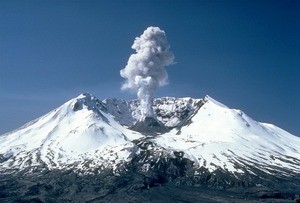
One thing urologists do when men come in with erectile dysfunction is order a testosterone test.
If you can’t afford a testosterone test, pay attention to your ability to ejaculate “under normal circumstances.”
Turns out that how you ejaculate can be a “canary in the coal mine” for hormonal imbalances, including increased prolactin production.
Research at Sloan Kettering in New York, among others, has proven the link between hormone imbalances and premature ejaculation, delayed ejaculation, and the inability to climax or ejaculate at all.
Further investigation, as reported by the International Society for Sexual Medicine, has directly linked delayed ejaculation with “hyperprolactinemia” — overproduction of prolactin in men.
But Wait! There’s more!
A 2009 study at Hadassah University Hospital in Jerusalem found that prolactin levels in infertile men were 2 to 3 times that of prolactin levels in men capable of fathering children (source).
That’s right. Not only does too much prolactin make it harder for you to ejaculate, but the sperm that does come out of you is likely to be unhealthy, damaged, or weak.
High Prolactin Can Cause ED
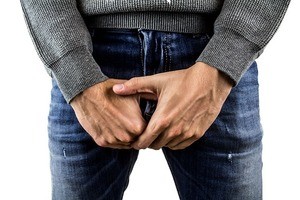
I’ve pointed out how prolactin can harm some of the processes responsible for your erectile health.
We also have evidence that sufficiently high levels of prolactin can directly cause erectile dysfunction.
That UCLA study I mentioned above found a direct correlation between having too much prolactin and the inability to achieve erection, and reduced libido in general.
Further research into the subject is ongoing, but it has reached the point that more and more urologists are recommending tests for prolactin levels when patients come in complaining of ED.
And remember, if you think you have high prolactin…
Your first indication that something is amiss is, your refractory period will increase, sometimes quite dramatically.
Delayed ejaculations come next, soon followed by unsatisfying erections or even outright erectile dysfunction.
7 Ways to Reduce Prolactin
The good news is you can reduce prolactin using natural methods, that are also just generally good for you.
As you try these prolactin lowering protocols…
Closely monitor your ease or difficulty ejaculating, nipple sensitivity and your refractory period, which are all excellent prolactin benchmarks.
You’ll know you’re on track if your ejac’s come easy and nipplle sensitivity and refractory periods are both down.
Lets go…
1: Get off SSRIs
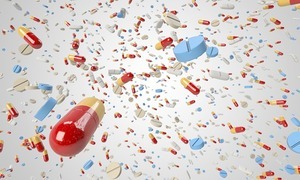
Once heralded as “miracle drugs” for anxiety and depression, these medicines — like Prozac, Lexapro, Paxil, and Zoloft — work by messing with how your brain processes the hormones responsible for emotion.
In the “No Surprises Here” department, it turns out that taking drugs which fiddle with some hormones can accidentally impact others in negative ways.
Research at Shahid Beheshti University in Iran, and a multi-university study conducted in the United States both found SSRI use can reduce testosterone and increase prolactin levels.
If you’re on SSRIs and worried about prolactin, I recommend talking with your mental health team about natural alternatives.
2: Increase Dopamine

We know from multiple studies that dopamine puts strong downward pressure on prolactin production.
That means that if your dopamine production goes up, prolactin production goes down. If dopamine production drops, prolactin increases.
Your mission, should you choose to accept it, is to increase your natural production of dopamine. That means cutting out some activities and adding in others.
Dopamine-harming activities you should do less of include:
- Boring or repetitive tasks
- Cell phone or social media addiction
- Excessive booze, weed or drug use
- Couch-centric activities, like Netflix or video games
You should eliminate tobacco products and masturbation to hard-core porn.
In the short term, they stimulate a dopamine boost…but in the long term, they reduce your sensitivity to dopamine. Which has the same impact as producing less dopamine overall.
Activities that will naturally, sustainably increase your dopamine production include:
- Sunlight exposure
- Exercising outdoors
- Spending time with people you care about
- Learning new skills or taking up new hobbies
- Listening to music, or playing an instrument
- Thrills like white water rafting or bungee jumping
- Activities that are new, novel or slightly risky
Do more of these, even when you’re not feeling motivated. Especially when you’re not feeling motivated.
3: Supplement With Mucuna Pruriens
You can get powder from this Indian flowering vine at most supplement shops, or from various venues online.
Pruriens comes from prurient, which Webster’s Dictionary say means “having an excessive interest in sexual matters.”
It’s so solidly linked to sexual performance it’s in the plant’s scientific name.
Mucuna pruriens impacts sexual health in a wide spectrum of ways, but the one we care about here is its well-established ability to increase dopamine.
It does this because it contains L-DOPA, the amino acid your body uses to create dopamine.
L-DOPA has been shown to have a significant impact on mood, and even neurological disorders like Parkinson’s.
Some of these effects can impact your dopamine production as well, giving you a double-whammy for reducing prolactin by upping your dopamine levels.
4: Take Vitamin B6 to Lower Prolactin
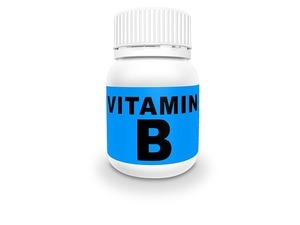
Because of the impact of prolactin on men’s sexual health, scientists have searched for ways to block its production for some time.
One of the go-tos for this is bromocriptine, which directly suppresses prolactin release.
However, like most industrially produced treatments, bromocriptine has side effects you don’t necessarily want to deal with.
Research published in the Journal of Pharmacological Science investigated how well vitamin B6 reduced prolactin production, comparing it in controlled trials to the impact of bromocriptine.
They found that taking a B6 supplement did significantly reduce prolactin production. It didn’t do so quite as much as bromocriptine, but it did so without the negative side effects.
5: Take Zinc to Lower Prolactin
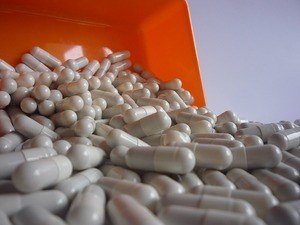
You can increase your zinc either with supplements or changes to your diet, but either way you should do it.
This one’s pretty straightforward.
Research in Brazil found that a dosage of zinc not only decreased prolactin, it did so immediately.
Significant reductions in blood levels of prolactin were noticed after 10 minutes. They don’t yet know why zinc does this, but whether or not it has this impact is well and truly established..
As a bonus, we already know that zinc also improves testosterone production. It’s one of the building blocks your body uses to create the hormone in the first place.
That’s another double-whammy.
6: Use Ashwagandha to Reduce Prolactin
A general wellness herb from India, ashwagandha is another of those traditional remedies Big Pharma seems to have forgotten about.
It’s been used for centuries, if not millennia, to increase fertility and libido in men.
But Big Medicine can’t ignore a 2009 study in India where subjects who took ashwagandha for three months saw a prolactin reduction by 12%, along with a 10% to 22% increase in testosterone.
As a bonus, the herb has also been shown to decrease cortisol, which directly inhibits testosterone production.
Ashwagandha also increases general feelings of wellbeing, which can help with dopamine production. It’s sort of a one-stop shopping place for your prolactin-reduction needs.
7: Take Vitamin E to Lower Prolactin
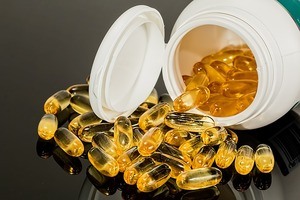
Vitamin E has been conclusively and repeatedly linked to reducing prolactin.
For example, with this study in Turkey where they tested vitamin E treatment against both a control group and a group who received a placebo (13).
You’ll increase your vitamin E in the same way you do most vitamins: through supplements and/or diet.
You can get vitamin E pills online or in supplement stores anywhere, but it tastes better when it comes in your food.
A few of my favorite vitamin E sources include:
- Almonds
- Mamey sapote
- Swiss Chard
- Hazelnuts
- Abalone
- Pine nuts
- Goose
- Atlantic salmon
- Avocado
- Rainbow trout
- Red sweet pepper
- Brazil nuts
- Mangos
- Turnip and mustard greens
- Spinach
- Kiwi fruit
High Prolactin and Low Testosterone: Conclusion
Don’t get me wrong. Your body is supposed to have a little prolactin in it. Just like you’re supposed to have a little estrogen.
But the rise in chronic high prolactin is just one more indication that modern day males are rapidly losing the masculinity battle.
Our testicles are shrinking. Our boobs are growing. Our testosterone is dropping year after year.
So what can you do about it?
Start with the prolactin reduction steps I outlined for you above. They’ll do what’s necessary for the inside of your body.
However, the environment outside your body is full of pollutants responsible for much of this hormonal chaos.
Here’s a whole article on these pollutants and how to avoid them. Read it when you can.
In the meantime, just throw away any conventional cosmetics you might be using (they’re full of the nasty stuff), and do your best to avoid plastics in your food storage and water carrying.
Finally, do your utmost to build testosterone naturally. When it comes to your hormonal balance, it’s best to attack the situation from both ends: reduce what hurts testosterone and improve what builds it.
Here’s another article I posted on exactly that.
It’s a list of changes you can make for your diet, exercise, lifestyle, and environment to keep your body producing testosterone at its maximum rate.
And remember, when your testosterone levels are in the zone, your prolactin are typically going to be in the zone as well.
